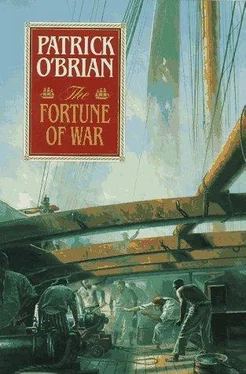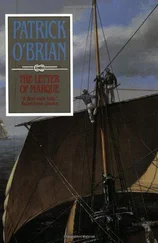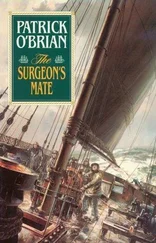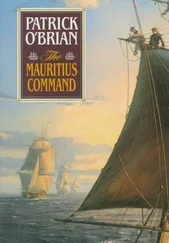Patrick O'Brian - The fortune of war
Здесь есть возможность читать онлайн «Patrick O'Brian - The fortune of war» весь текст электронной книги совершенно бесплатно (целиком полную версию без сокращений). В некоторых случаях можно слушать аудио, скачать через торрент в формате fb2 и присутствует краткое содержание. Жанр: Книги. Описание произведения, (предисловие) а так же отзывы посетителей доступны на портале библиотеки ЛибКат.
- Название:The fortune of war
- Автор:
- Жанр:
- Год:неизвестен
- ISBN:нет данных
- Рейтинг книги:3 / 5. Голосов: 1
-
Избранное:Добавить в избранное
- Отзывы:
-
Ваша оценка:
- 60
- 1
- 2
- 3
- 4
- 5
The fortune of war: краткое содержание, описание и аннотация
Предлагаем к чтению аннотацию, описание, краткое содержание или предисловие (зависит от того, что написал сам автор книги «The fortune of war»). Если вы не нашли необходимую информацию о книге — напишите в комментариях, мы постараемся отыскать её.
The fortune of war — читать онлайн бесплатно полную книгу (весь текст) целиком
Ниже представлен текст книги, разбитый по страницам. Система сохранения места последней прочитанной страницы, позволяет с удобством читать онлайн бесплатно книгу «The fortune of war», без необходимости каждый раз заново искать на чём Вы остановились. Поставьте закладку, и сможете в любой момент перейти на страницу, на которой закончили чтение.
Интервал:
Закладка:
Stephen had no great love of the English government in its dealing with Ireland; in fact he had actively conspired against it. But he was deeply attached to individual English men and women, and in any case he did not like anyone to abuse the country but himself. 'You are mistaken, Mr McLean,' he said, 'in supposing that the English have no generals. They have; and the truth of the matter is that all of them who accomplish anything, such as Lord Wellington, are Irish. Much the same applies to their writers. Let us return to the parietal foramen and the anomalous carnassial teeth of this Otaria: at the present rate we shall not have described half the Phocidae before we reach the Cape. Nay, before we reach England! And they are decaying fast. Pray, take care of your tobacco-pipe, Mr McLean. It is leaning on the spirit-pot; and you are to consider, that should it take fire, all the specimens we have already described must infallibly be lost.'
Stephen's days were busy, and in spite of the gloom of the gunroom and of McLean's shortcomings most unusually enjoyable. His evenings were usually spent in the cabin, playing music with Jack and Captain Yorke as the ship ran on and on, urged by Warner's unremitting zeal. He often dined there too, escaping the gunroom's purely naval conversation and Spartan fare; for whereas La Fl�e's officers had nothing but their pay, Yorke was possessed of comfortable private means. He kept a table, and nearly every day invited two or three of his officers or young gentlemen. After one of these dinners, at which the first lieutenant, the master, and Forshaw had been present, Stephen was walking on the quarterdeck to air his mind and to dispel the fumes of the Captain's port before rejoining McLean in the depths. The fine quartering breeze had slackened, and it had also drawn more astern, so that there was little refreshment in it; and in spite of the awning the sun beat down with more than common force. It was a make-and-mend day, and the Flitches were scattered about the deck forward of the mainmast, quietly sewing and darning, but Warner had scarcely taken a couple of turns, looking up at the rigging and laying his hand on the braces, before he gave an order: the placid groups among the guns broke up in an apparent chaos. Three sharp pipes of the bosun's call; the chaos resolved itself into a pattern; another pipe, and the ship spread her studdingsails. The booms bent, settled to the strain, and the speed increased perceptibly; at the same time what little refreshment there had been died quite away. Stephen took off his coat and folded it absently, his mind dwelling on the question of the anomalous Otaria, with four roots to its carnassial teeth: if in fact it should prove to be a distinct species, which seemed likely, he should name it after McLean. That would be a handsome compliment, a gleam of fame more valued than an appointment to a line-of-battle ship; it would also far outweigh the short answers Stephen had given recently, when McLean had been more than usually wearisome about the English. Like some other Scots he knew, McLean seemed to labour under some sense of inferiority; and to labour rancorously. Strange: it could never occur to an Irishman. And yet the situation of the two countries - here a cascade of small coins, a snuff-box, a tinder-box, a spunk-box, a penknife, two lancets, a cheroot-case, a duodecimo Horace, some pieces of rosin, a variety of small bones and mammalian teeth, and a partially-eaten biscuit fell from his inverted coat pockets on to the deck. Forshaw helped him pick them up, gave him some advice on the proper, the seamanlike, way of folding a coat, warned him against creasing it and against undue exposure to the sun, and said he should carry the coat down for Killick to hang it up in the Doctor's cabin. The cabin was of course below, but Forshaw's road took him by inconsequential leaps along the top of the hammock-cloths with nothing between him and the white racing water but a little slippery canvas: just as he was about to dodge between the forecourse and its deeper studdingsail he lost his footing in a way that would have made Mrs Forshaw turn deathly pale and that did make Dr Maturin feel anxious for his coat. But he seized the sheet and hung there for a moment, laughing up at a friend in the foretop, before vanishing between the sails, as safe as a young ape in its native wood: and as he balanced there in his best cabin-going uniform of silver-buckled shoes, white breeches and blue coat, with his teeth flashing in his sunburnt face and his hair streaming in the wind, he looked uncommonly fetching.
'Can you imagine anything more beautiful?' said Warner, in his harsh, grating voice.
'Not readily,' said Stephen.
'Cracking on when the sun is bright has always been a joy to me,' said Warner quickly, 'and now we have just about everything abroad that she can bear.'
'A noble spread of sails, upon my word,' said Stephen; and indeed he was by no means unmoved by the beauty of sail above sail, sail beyond sail, taut, rounded, and alive, nor by the huge curved shadows, and intricate geometry of line and brilliant surface. But whereas he had often seen a ship under royals and studdingsails aloft and alow, tearing through the deep blue sea with a bone in her teeth, he had rarely seen such a look of hunger, of hunger combined with something else - admiration or rather wonder, affection, tenderness.
'Poor man,' he reflected. 'The instinct so very strong, so very nearly unconquerable even in a phlegmatic. If he is, as I suppose, a paederast, small wonder he should be glum. When I consider what desire has done for me, how it has torn my heart - and mine an avowable desire, glorified by specious, heroic names - I am astonished that such men do not consume themselves entirely. A hard fate, to be shut up day after day with such a longing in a ship, where everything is known; and where this must not be known; where there must be no approach to an overt act.'
The Flitches were no brighter than the next ship's company, but as Dr Maturin observed there was little they did not know of what went on aboard. They knew the nature of Warner's inclinations, for all his ceaseless, rigorous control. They knew that their Captain was an indolent, easy-going, good-natured man, with little ambition to rise and shine in his profession or anywhere else; that he would fight like a good 'un if called upon to do so - he had given proof of that - but that he had no restless urge for action, that he was quite content with a small post-ship rather than a dashing frigate; and that although he would rather have been sent up the Mediterranean, where he could contemplate the Greek remains, he was happy to carry despatches to and from the Indies, leaving the running of the ship to his capable first lieutenant. They knew that the bosun and the carpenter had contrived to move a surprising quantity of the ship's stores to unfrequented places, and they had little doubt that these objects would vanish once La Fl�e reached the Cape: the only question was, who shared? They knew a great many other things, some of no importance whatsoever, such as that the Leopard's midshipmen were finding the voyage a burden to their spirits.
Jack Aubrey was a conscientious captain; he thought it his duty to form his youngsters, most of whom had been entrusted to him by friends or relations, not only into officers who understood their profession but into reasonably moral and socially presentable beings as well. During the first part of the Leopard's voyage he had delegated much of this to the schoolmaster and the chaplain; then from the time these men vanished he had had little leisure for education; but now the whole day was his own, and he devoted far more of it than they liked to leading his reefers through Robinson's Elements of Navigation, None's Epitome, and Gregory's Polite Education. For his part Jack had received precious little education, polite or otherwise, and he learnt a great deal from Gregory as he went along - an exact list of the kings of Israel, among other things. There were no doubt conscientious captains at the time of the Spanish armament, when he first went to sea; but those he had sailed with had confined themselves to seeing that their midshipmen's drinking and whoring were kept within limits, limits that varied according to the captain. Only one of his early ships had carried a schoolmaster, a gentleman who passed his waking hours in an alcoholic haze; so that apart from a term or two at school by land, where a little Latin had been beaten into him, he was, from the point of view of literature, as the beasts that perish. Seamanship, of course, had come naturally to him he was a born mariner and then he had fallen in love with mathematics, a late love, but fruitful. Yet in the new, smoother, more scientific Navy that was coming into being this was not enough: his youngsters must add a powerful dose of Gregory to their Robinson. He made them read The Present State of Europe, Impartially Considered; he saw that the journals they were required to keep would meet the inspection of the severest board of examiners; he stood by while his coxswain taught them the finer points of knotting and splicing. It was a pity that his material was so indifferent, so refractory to anything but the knots and splices; for his intentions were of the best. In some commissions he had had midshipmen who loved the mathematics too, who doted upon spherical trigonometry, so that it was a pleasure to teach them navigation; it was not the case at present.
Читать дальшеИнтервал:
Закладка:
Похожие книги на «The fortune of war»
Представляем Вашему вниманию похожие книги на «The fortune of war» списком для выбора. Мы отобрали схожую по названию и смыслу литературу в надежде предоставить читателям больше вариантов отыскать новые, интересные, ещё непрочитанные произведения.
Обсуждение, отзывы о книге «The fortune of war» и просто собственные мнения читателей. Оставьте ваши комментарии, напишите, что Вы думаете о произведении, его смысле или главных героях. Укажите что конкретно понравилось, а что нет, и почему Вы так считаете.












